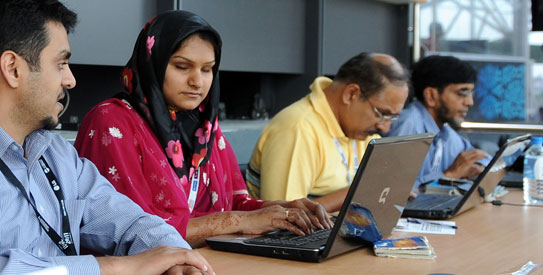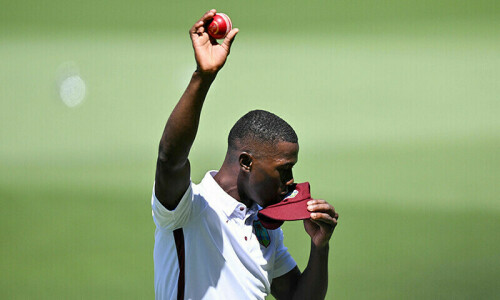
COLOMBO: Sania Zaidi sits in the R. Premadasa stadium press box as the World Cup drama unfolds beneath her.
Nothing unusual about that except the 28-year-old Pakistani journalist has been blind since childhood and is on a mission to promote better relations between Pakistan and India.
“I want cricket to promote peace, courtesy and courage which we have been lacking in our wonderful world. I can't see it but I can sense it and am here at this World Cup to promote my mission,” Sania told AFP.
Working on a laptop with special software, the college professor from Multan in central Punjab is hard-working and determined.
On her mobile phone she tapes all the tournament press conferences to use in her stories for a Pakistan magazine as well as radio bulletins.
Her objective is to tell the world about Pakistan and its love of cricket and the heartache caused by the sport's international suspension in the country following the terrorist attack on the Sri Lankan team bus in Lahore in 2009.
The brazen attacks, which left eight people dead and seven Sri Lankan players and their assistant coach injured, forced Pakistan to play its home series on neutral venues.
It also prompted the International Cricket Council to strip Pakistan of its right as a co-host of the 2011 World Cup, a move which Sania deplores.
“Countries like Australia, England, India and South Africa have abandoned touring us, which is very sad,” she said.
“I think they must realise that cricket should go on and we can only defeat terrorism by facing it, not by leaving it unchallenged.”
With a master's degree in mass communication and busy working on her post-graduate studies, Sania teaches at the Bahauddin Zakaria University in Multan, the home city of Pakistan prime minister Yousuf Raza Gillani.
But cricket reamins her major interest, having compiled two books of interviews with several players from Pakistan, Sri Lanka, India, the West Indies and England.
“I have interviewed a number of players but the ones I did with Indian batting legends Rahul Dravid and Sachin Tendulkar stand out for me,” said Sania, who most of the Sri Lankan players know by name.
In between covering matches, she found her match in Khawaja Mohammad Khan, a teacher of sociology in Multan, who has no interest in the game.
“My husband is here in Sri Lanka and I am trying my level best to teach him cricket, so that he can help me in my mission of promoting peace through cricket,” said Sania, who intends to travel to India for the April 2 final.
“I want to tell the Indian people that we want brotherly relations with them and cricket is one way to promote that.”














































